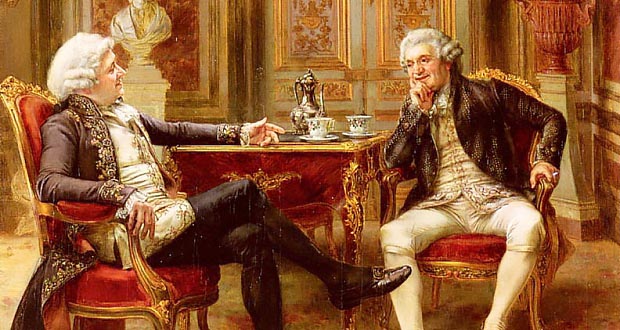In O. Henry’s short story “The Social Triangle,” Ikey Snigglefritz, a simple tailor’s apprentice, receives his week’s wages and on his way home enters the Café Maginnis. There he accidentally meets Billy McMahan, a politician whom he admires as “the greatest man, the most wonderful man… that the world had produced.”
Offering his hand to Billy, Ikey spontaneously volunteers to buy drinks for “the king of men” and all his friends. Without a second thought he spends an entire week’s wages to regale his favorite political leader as a token of gratitude—an act of generosity that later provokes the anger of his mother and sisters who are counting on his income. Ikey, however, never regrets his gesture of extravagant spending despite the carping criticism he receives: “Compared with what he had received, the loss of wages and the bray of women’s tongues were slight affairs.”
This episode is not just an ephemeral occurrence but a precedent that prompts similar spontaneous gestures of friendliness and good will. When Billy McMahan and his wife are dining at a fashionable restaurant in formal attire, Billy notices a millionaire whom he has always praised for his generosity to charitable causes. Without the slightest hesitation Billy “in the most startling and audacious act of his life” walks to the table of Cortlandt Van Duyckink, shaking hands and complimenting the distinguished benefactor: “I’ve heard you was talking about starting some reforms among the poor people down in my district… I’ll do all I can to help you.” Like Billy who was touched by Ikey’s warm affection and kind offer to buy drinks, Cortlandt also is moved by Billy’s good heart and amiable spirit: “Thank you, Mr. McMahan.. I have been thinking of doing some work of that sort. I shall be glad of your assistance.”
One spontaneous gesture of introduction flowing from a grateful heart inspires a second one. The poor Ikey follows his heart, ignoring the difference in social class between a tailor and a politician known as “a four-walled tower in business, a mogul, dread, loved and obeyed among his own people.” Billy too overcomes caution, never doubting the propriety of shaking the hand of a renowned benefactor, “a man worth eighty millions,” and never letting the difference in economic status interfere with a human relationship.
Ikey and Billy, in effect, pay a compliment that is most appreciated and welcomed that it produces a great, unexpected effect. Ikey inspires Billy, and Billy moves Cortlandt to establish soup kitchens in the lower east side of New York, raze uninhabitable tenements, and build new apartments. In his visit to this impoverished part of the city, the millionaire examines the housing conditions and greets one of the occupants coming down the stairs: “Obeying a sudden impulse, Van Duyckink stepped out and warmly grasped the hand of what seemed to him a living rebuke”– the hand of Ikey whose lot epitomizes the sordid misery of the struggling working class. Without knowing Ikey, the millionaire greets the tailor with the same handshake that Ikey extended to Billy and Billy offered to Courtlandt: “‘I want to know you people,’ he said, sincerely. ‘I am going to help you as much as I can.’”
When Ikey notices Billy in the Café Maginnis, he greets him and shakes his hand on the basis of “an audacious, thrilling impulse.” When Billy recognizes Cortlandt at the restaurant, he performs “the most startling and audacious act of his life” by introducing himself with a handshake. And when the millionaire visits the slums, he too, “obeying a sudden impulse” acts with spontaneous self-forgetfulness in approaching the stranger who happens to be Ikey: “He had shaken the hand of Ikey Snigglefritz.” Ikey’s greeting and handshake exert as great an influence as the political power of Billy and the millionaire wealth of Courtlandt. Three compliments and three handshakes transfigure the world in a way that politics and economics alone cannot achieve.
Ikey’s extravagant spending of his week’s wages was not wasted or spent in vain but acted like a catalyst. He inspired Billy who roused Cortlandt who reciprocated with the same favor to Ikey that the tailor performed for his favorite politician. A kind deed transcends all social classes and economic backgrounds. The human touch of a compliment and a handshake speaks a universal language. As Aesop teaches in his fable about the lion and the mouse, a good deed is never wasted. As Hans Andersen shows in “The Traveling Companion,” a good deed is like a buried seed, hidden and forgotten, but potent and fruitful.
To be human is to act in spontaneous ways governed by a kind, pure heart moved by a spiritual power, and the art of living always practices the flexibility to make allowances for the unforeseen and unplanned that make life serendipitous and adventurous.
Inspired? What spontaneous gesture will you offer today?

 Seton Magazine Catholic Homeschool Articles, Advice & Resources
Seton Magazine Catholic Homeschool Articles, Advice & Resources
